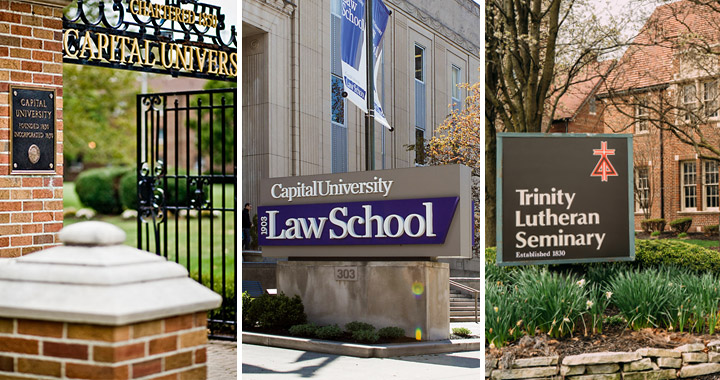Each month, Capital University takes immense pride in showcasing the remarkable accomplishments of our faculty, staff, and students. These achievements, ranging from groundbreaking research and innovative projects to significant contributions in various fields, reflect the vibrant intellectual community and commitment to excellence that define our institution. Join us in applauding these milestones and the individuals who are not only advancing their respective disciplines but also shaping the future of our university and community.
Congratulations to Dr. Chad Payton (music) who presented Unclenching the Tube: Fifteen Strategies for Achieving a Balanced Choral Onset at the Ohio Music Educators Association Professional Development Conference. The session aimed at helping choral educators teach ways to reduce excess tension from their students' voices. Payton said that “Presenting to a room full of choral educators is one of my favorite things to do! They are on the front lines of music education, and the more I can give back by sharing practical ways of enhancing their pedagogy, the more connected we all are in chasing beautiful sounds.”
Praise for Dr. Rachel Wrenn (seminary) who spoke at the Kristallnacht Remembrance at the Jewish Community Center about women and interfaith issues in light of the 999 girls who were the first official Jewish prisoners sent to Auschwitz. At the Remembrance, Wrenn said "Tonight, we will hear about women whose lives were stolen and whose futures were turned to ghosts. We will hear about women whom death, hatred, bigotry, oppression, and evil tried to silence. And tonight, we will bear witness to those women whose memory slipped through the cracks in all of those hateful forces, to survive and to live on. May their words, their lives, and their testimony, slip between the cracks in our own hearts. May they call forth from us a faith that rings with the echoes of their own fierce resilience.” Wrenn also presented Anger at God in the Psalms and in Ourselves at the Tifereth Israel, local Jewish synagogue. In this presentation, she explored anger at God in the Psalms, focusing on anger that stems from acts of injustice against those who are vulnerable.
Additional congratulations to Dr. Rachel Wrenn (seminary) who presented Leviticus and the Land: Stewardship and Sabbath at the Fall Theological Conference of the Northwest Intermountain Synod of the ELCA. Wrenn examined how we should view the land through the lens of the biblical book of Leviticus and correspondingly, should take care of the land today.
Congratulations to Dr. Kevin Griffith (English) who published three poems, Aphorisms I, Aphorisms 2, and Aphorisms 3 in Abandoned Mine: A Journal of Poetry, Issue 10, November 2024. Griffith said “As someone who teaches poetry, it's important to me to stay active in writing and publishing.”
Congratulations to Dr. Gail Lehto Zugger (music) who presented Clarinet 101: Simple Steps to Improve Your Clarinet Section at the OMEA (Ohio Music Educators Association) Professional Development Conference. This presentation to music educators provided pedagogical tips for diagnosing visually and aurally common clarinet problems and how to teach successful habits. Zugger said that she found it “rewarding to assist music teachers, most who are not clarinet players primarily, to be more effective when working with their clarinet students. Especially instructors in areas that may not have access to clarinet experts for a variety of reasons.”
Kudos to music students Alex Blum, Elizabeth Corn, Nicholas Daniels, Sam Gulas, Vivian Haase, Roman Huss, Grace Johnson, Mari Lyke, Toni Patterson, Paige Stover, Tatiana Sullivan (the Capital University Clarinet Choir) who were selected through a blind audition process to perform a full-length concert at the OMEA (Ohio Music Educators Association) Professional Development Conference. The group is directed by Dr. Gail Lehto Zugger (music) and featured graduating senior Tatiana Sullivan as a clarinet soloist and Dr. Ishbah Cox (music) as guest conductor. Zugger provided the following praise: “The CU Clarinet Choir has been in existence as an ensemble for over 60 years, it was exciting for us to have this opportunity to showcase the Music department in a state-level performance venue. In addition, our preparations for the performance were assisted by Eugene Marquis, CU Clarinet studio alum (BM'68) who drove up from Cincinnati to listen to rehearsals and provide feedback. A full circle moment, Mr. Marquis was the featured guest soloist when the CU Clarinet Choir performed at the OMEA conference in 1971! It was awesome for our current students to work with Mr. Marquis! I am very proud of these students' performance in Cleveland!”
Congratulations to Dr. Baiju Markose (seminary) who published the book chapter Divine Providence and Critical Liminalities: An Ecotheopoetic Search for Post-Anthropic Subaltern Planetary Ethics in Making Room for the Story to Continue? Volume 4 in the An Earthed Faith: Telling the Story amid the ‘Anthropocene’ series, published by the University of the Western Cape. Markose found the opportunity to contribute to such a pressing and relevant topic both humbling and inspiring.
Congratulations to Dr. Kimberly Loscko (biology) and students Medhane Negasi, Emily Bartholomew, Jaden Tagaoen who will present From Books to Bytes: Evaluating Student Motivation with Integrated Reading Assignments at both the Ohio Project Kaleidoscope (OH-PKAL) Conference and the Human Anatomy and Physiology Society of Educators 39th Annual National Conference. The research team investigated how the frequency of integrated e-book assignments in a two-semester anatomy sequence and correlated with student motivation. Three key variables were examined: the frequency of e-book assignments, engagement metrics, and self-reported motivation levels. Throughout the semester, 16 e-book assignments were administered, with average completion rates recorded. Engagement metrics were assessed using two Likert scale questionnaires that focused on student experiences and interactions with e-book features, while motivation levels were compared across the two semesters. According to Loscko, “Exploring the correlation between e-book assignment frequency and student motivation, provided us with valuable insights into how digital tools can influence engagement and motivation in the classroom, while also enhancing teamwork and analytical skills.”
